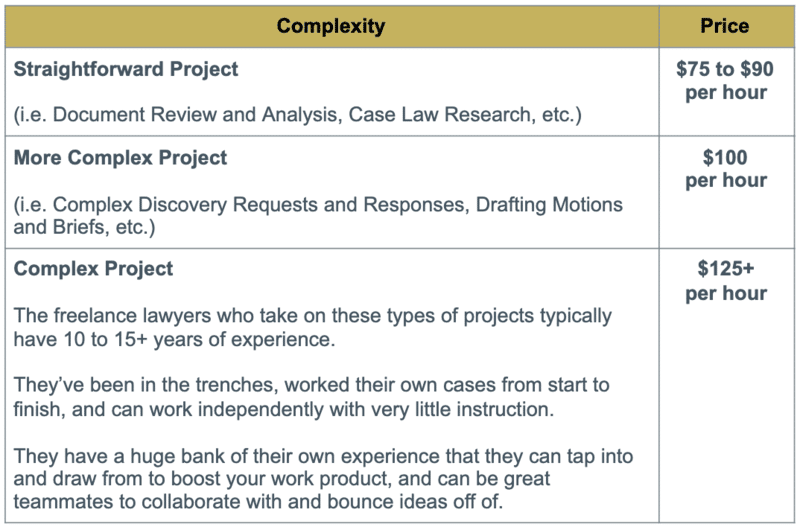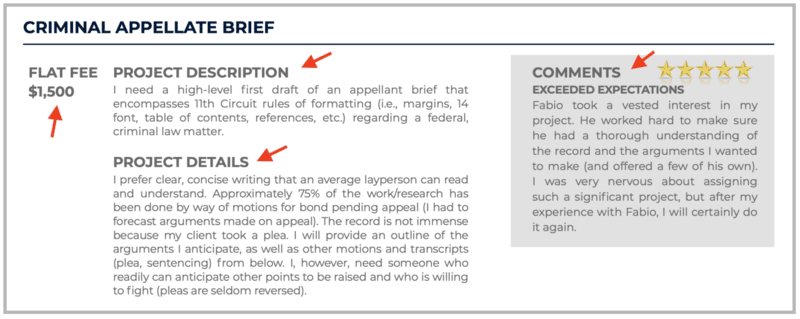Since launching our freelance lawyer marketplace three years ago, we’ve interacted with thousands of hiring attorneys in a variety of practice areas all over the country.
One of the most common questions we get from hiring attorneys is, “How much can I expect to pay a contract attorney?”, and in this post, we will cover that comprehensively.
First, we will discuss one of the most important factorswhen it comes to setting a reasonable rate for your outsourced work to a contract lawyer (aka freelance lawyer): complexity of the work.
Then, we will share real examples of projects that have been posted on our marketplace, along with the rate that the contract attorney earned for their work. By seeing real examples of how other hiring attorneys are using our marketplace (as opposed to general advice) you can get a much more concrete idea of how much you can expect to pay a contract attorney.
Following that, we will share the benefits of paying a contract attorney via a flat fee method, as opposed to the traditional hourly rate approach where you may get a surprise bill at the end that’s higher than expected.
Finally, we will discuss how you can increase your law firm’s profitability by outsourcing work to contract attorneys (just like firms make money by leveraging full time, in-house associates).
Note: If you’re a busy solo or head of a small firm and need an extra set of hands, we can help. Tap our nationwide network of over 3,000 freelance lawyers for on-demand, project-based work. Learn more and sign up for a demo here.
Pricing Projects Based on the Complexity of the Work
All of the work done on LAWCLERK is done for a flat fee price, per Project. There are many factors that go into consideration when setting a reasonable rate for your Project, such as area of law, geographic location, experience level of the contract attorney, turnaround time, and complexity level of the work.
Among these factors, complexity level isthe most accurate predictor of how much you can expect to pay a contract attorney. If you need something that requires a more sophisticated approach, then the contract attorney’s hourly rate will be higher.
While there is no one size fits all approach, here are starting rate suggestions (based on project complexity) that will generally hold true from our experience:

Recently Posted Projects by Area of Law
Different areas of law command higher rates than others, since some areas tend to involve more complicated work.
To illustrate this, we put together documents with real examples of recently posted Projects categorized by area of law (i.e. immigration, bankruptcy, criminal, and manymore) which you can find on the attorney resources section of our site:
Inside each document, you will find multiple project examples that contain information about the:
-
Price that the hiring attorney paid the contract lawyer for the project.
-
Project description.
-
Project details.
-
Comment and rating that the hiring attorney left for the freelance lawyer.
For example:

By seeing what types of projects lawyers are outsourcing within your practice area, their complexity, and the flat fee the hiring attorney paid the contract lawyer, you will:
- Get a better understanding of what you can expect to pay contract lawyers for similar projects.
- Get new ideas of legal tasks that you can outsource to contract lawyers.
Benefits of Paying Contract Attorney via a Flat Fee Method (As Opposed to the Traditional Hourly Rate Approach)
Traditionally, hiring attorneys have paid contract lawyers on an hourly basis. But over the years, we’ve heard countless stories from hiring attorneys who got a much higher bill than they expected.
For example, you may anticipate that a certain project will take around 10 hours, but instead receive a bill for 30 hours.
Because of this, our freelance lawyer marketplace works on a flat fee basis, per Project, where you get peace of mind and control over what you’re spending to get that work done.
How to Set a Reasonable Flat Fee
Say you need a contract lawyer to draft a motion for summary judgement. Based on your years of experience and expertise, you estimate that it should likely take them 8-10 hours to complete. We recommend using the higher number in the range you come up with to be safe.
Based on the level of sophistication of the work, you determine a reasonable price per hour to be $125.
In this scenario, if you go with the higher estimate of 10 hours, and you’re willing to pay $125/hour, then the flat fee price for the project would be $1,250.
This is an approach of setting a flat fee for a Project while still using an underlying hourly calculation.
On the flip side, how do you set a flat fee price when you are already doing work on a flat fee basis for the client?
We’ll demonstrate with an example.
Say a client hires an immigration attorney to work on a certain type of visa application, and the client is paying a flat fee of $10,000. The immigration attorney needs help within the scope of the representation to respond to an RFE (Request for Evidence). They estimate that the billable value of that segment of work is $2,500.
Based on our guidelines, it would be reasonable to pay the contract attorney somewhere between 35 to 40% of the billable value of that work that is being outsourced.
40% of $2,500 = $1,000 paid to the contract attorney to have them prepare the response to the RFE.
Increasing Your Law Firm’s Profitability by Delegating Legal Work to Contract Lawyers
One of the most common questions we get is, “Can you make money via outsourcing?”, and the answer is an emphatic yes!
The ethics rules, opinions, and case law all overwhelmingly say that hiring attorneys can make money by outsourcing work to contract lawyers (just like firms make money by leveraging in-house associates). The key rule to keep in mind is Model Rule 1.5, which states that the fee that you charge your client related to the work of the contract lawyer has to be reasonable.
Here’s some math to bring this to life…
Say you delegate drafting a trust amendment to a contract lawyer. You agree on a flat fee of $1,000 for them to do that work. They come back to you and report that they worked 8.5 hours on that project.
Note: all of our freelance lawyers are required to track the time they spend working on a project through LAWCLERK, so that you have the necessary data (hours worked) to bill your client at a reasonable market rate.
You determine that a reasonable market rate is $200.
So 8.5 hours x $200 = $1,700 billed to the client for that work.
Since you paid the contract lawyer $1,000, that means you generated another $700 of revenue for your firm. If you replicate this over multiple projects, those numbers really add up!
Questions About Pricing Projects? Our Dedicated LAWCLERK Advisors Can Help!
Without a doubt, the most common question we get is related to pricing Projects.
Every attorney who registers for a free hiring account at LAWCLERK is matched up with one of our dedicated advisors who can get on a call and walk you through setting a reasonable market rate for your project (something that they specialize in since they help attorneys all over the United States with that exact matter on a daily basis).
To add to that, your dedicated advisor can:
- Walk you through setting up your first Project
- Help you write an attractive project description that entices talented contract lawyers to apply.
- Help you pick the best possible applicant for the Project.
- Answer any questions you have related to legal outsourcing via phone or email.
Note: If you’re a busy solo or head of a small firm and need an extra set of hands, we can help. Tap into our nationwide network of over 3,000 freelance lawyers for on-demand, project-based work. Learn more and sign up for a demo here.



















